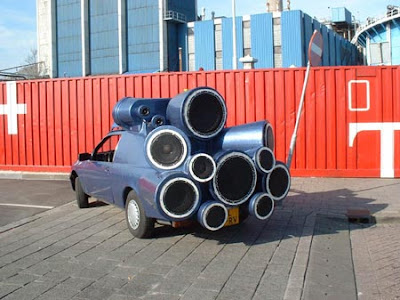Difference between revisions of "History of Computers - Speakers"
| Line 5: | Line 5: | ||
== Overview == | == Overview == | ||
| − | The first electronic speaker was installed by Johann Phillipe Reis in 1861, which he attached to his telephone. After a few new versions, he was capable of reproducing sounds. Since then, speakers have come a long way. Now, speakers can be very small or very large. A speaker works by using electromagnetism. A coil of wire is wrapped around a plunger-like device, that moves back and forth to create pressure waves in the air. When electricity flows through the wire, the magnetic center on the plunger like device moves back and forth, which creates the pressure waves. | + | The first electronic speaker was installed by Johann Phillipe Reis in 1861, which he attached to his telephone. After a few new versions, he was capable of reproducing sounds. Since then, speakers have come a long way. Now, speakers can be very small or very large. A speaker works by using electromagnetism. A coil of wire is wrapped around a plunger-like device, that moves back and forth to create pressure waves in the air. When electricity flows through the wire, the magnetic center on the plunger like device moves back and forth, which creates the pressure waves <ref> http://ocw.mit.edu/high-school/engineering/guitar-building/physics-of-the-guitar/how-a-speaker-works-and-how-your-ear-hears-one/ </ref>. |
http://www.musicademy.com/wp-content/uploads/2011/02/tiny-speakers.jpg | http://www.musicademy.com/wp-content/uploads/2011/02/tiny-speakers.jpg | ||
| Line 18: | Line 18: | ||
== '''References''' == | == '''References''' == | ||
| − | + | <references/> | |
Latest revision as of 10:15, 14 September 2015
Introduction
Speakers are basic audio output devices that receive electrical signals and translate them into vibrations, producing audio.
Overview
The first electronic speaker was installed by Johann Phillipe Reis in 1861, which he attached to his telephone. After a few new versions, he was capable of reproducing sounds. Since then, speakers have come a long way. Now, speakers can be very small or very large. A speaker works by using electromagnetism. A coil of wire is wrapped around a plunger-like device, that moves back and forth to create pressure waves in the air. When electricity flows through the wire, the magnetic center on the plunger like device moves back and forth, which creates the pressure waves [1].


Significance
Speakers are very important to the history of computers because without speakers, it would be impossible to listen to music at home without having the band go to your house and play the music.